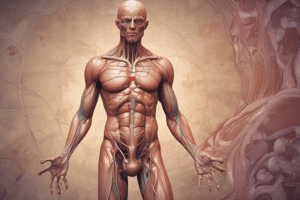Podcast
Questions and Answers
At what week of embryonic development do the gonads begin to form?
At what week of embryonic development do the gonads begin to form?
- 6th week
- 8th week (correct)
- 4th week
- 10th week
Which of the following describes the stage when embryonic reproductive structures of males and females are alike?
Which of the following describes the stage when embryonic reproductive structures of males and females are alike?
- Embryonic stage
- Indifferent stage (correct)
- Development stage
- Differentiation stage
What hormones do female gonads, or ovaries, primarily produce?
What hormones do female gonads, or ovaries, primarily produce?
- Follicle-stimulating hormone
- Testosterone
- Estrogen and progesterone (correct)
- Luteinizing hormone
Which term refers to the reproductive cells produced by males?
Which term refers to the reproductive cells produced by males?
What can result from interventions with the normal pattern of sex hormone production in the embryo?
What can result from interventions with the normal pattern of sex hormone production in the embryo?
What is the primary treatment for gonorrhoeae?
What is the primary treatment for gonorrhoeae?
What serious health issues can untreated syphilis potentially lead to?
What serious health issues can untreated syphilis potentially lead to?
What is the causative bacterium of Chancroid?
What is the causative bacterium of Chancroid?
Which type of herpes simplex virus generally affects the mouth or face?
Which type of herpes simplex virus generally affects the mouth or face?
What symptoms might occur during the second stage of syphilis?
What symptoms might occur during the second stage of syphilis?
What defines a pseudohermaphrodite?
What defines a pseudohermaphrodite?
Which condition describes undescended testicles?
Which condition describes undescended testicles?
What is the primary characteristic of phimosis?
What is the primary characteristic of phimosis?
Which of the following infections is commonly associated with the male reproductive system?
Which of the following infections is commonly associated with the male reproductive system?
What marks the end of a woman's reproductive capability?
What marks the end of a woman's reproductive capability?
Which factor is NOT a contributor to human sexual behavior?
Which factor is NOT a contributor to human sexual behavior?
Where in the body are the erogenous zones primarily located?
Where in the body are the erogenous zones primarily located?
Which of the following is classified as a sexually transmitted microorganism?
Which of the following is classified as a sexually transmitted microorganism?
What type of behavior involves only one individual?
What type of behavior involves only one individual?
Which type of sexuality is most commonly accepted within modern Western society compared to Filipino society?
Which type of sexuality is most commonly accepted within modern Western society compared to Filipino society?
What is a physiological response characterized by an increase in pulse and blood pressure during the excitement phase?
What is a physiological response characterized by an increase in pulse and blood pressure during the excitement phase?
Which part of the brain is believed to be responsible for regulating the sexual response?
Which part of the brain is believed to be responsible for regulating the sexual response?
Which of the following is classified as a psychological problem affecting sexual health?
Which of the following is classified as a psychological problem affecting sexual health?
Which sexually transmitted disease is primarily caused by a virus that attacks the immune system?
Which sexually transmitted disease is primarily caused by a virus that attacks the immune system?
What is one of the least common types of sexual problems?
What is one of the least common types of sexual problems?
Which of the following is a common symptom of Chlamydia?
Which of the following is a common symptom of Chlamydia?
Which sexual behavior is often condemned due to social norms?
Which sexual behavior is often condemned due to social norms?
What is a common misconception about good sexual performance as held by society?
What is a common misconception about good sexual performance as held by society?
What type of sexual abstinence involves avoiding all intimate genital contact?
What type of sexual abstinence involves avoiding all intimate genital contact?
Which health complication can arise from sexually transmitted diseases?
Which health complication can arise from sexually transmitted diseases?
What treatment is commonly used to manage HIV/AIDS?
What treatment is commonly used to manage HIV/AIDS?
Which of the following is a defining characteristic of the plateau phase in human sexual response?
Which of the following is a defining characteristic of the plateau phase in human sexual response?
What is the primary reason for taking antiviral medication for herpes simplex?
What is the primary reason for taking antiviral medication for herpes simplex?
What type of HPV is most commonly linked to cancer development?
What type of HPV is most commonly linked to cancer development?
Which method is classified as a natural method of contraception?
Which method is classified as a natural method of contraception?
How does the Basal Body Temperature method indicate ovulation?
How does the Basal Body Temperature method indicate ovulation?
What is the main function of hormonal injections in contraception?
What is the main function of hormonal injections in contraception?
What is one disadvantage of the Coitus Interruptus method?
What is one disadvantage of the Coitus Interruptus method?
What is the primary purpose of a diaphragm in contraception?
What is the primary purpose of a diaphragm in contraception?
What is a common feature of high-risk forms of HPV?
What is a common feature of high-risk forms of HPV?
Which artificial contraceptive method is commonly administered via skin application?
Which artificial contraceptive method is commonly administered via skin application?
What is the function of spermicides in contraception?
What is the function of spermicides in contraception?
Which of the following describes a surgical method for male contraception?
Which of the following describes a surgical method for male contraception?
What characterizes genital warts caused by HPV?
What characterizes genital warts caused by HPV?
How long can subdermal implants be effective for contraception?
How long can subdermal implants be effective for contraception?
What is the role of the cervical mucus method in tracking ovulation?
What is the role of the cervical mucus method in tracking ovulation?
Flashcards
Gonads
Gonads
Reproductive glands that produce hormones such as estrogen, progesterone (ovaries), and testosterone (testicles).
Gametes
Gametes
Reproductive cells (sperm and egg).
Pseudohermaphrodites
Pseudohermaphrodites
A condition where external genitalia do not match gonadal sex.
Hermaphrodites
Hermaphrodites
Signup and view all the flashcards
Cryptorchidism
Cryptorchidism
Signup and view all the flashcards
Phimosis
Phimosis
Signup and view all the flashcards
Puberty
Puberty
Signup and view all the flashcards
Prostatitis
Prostatitis
Signup and view all the flashcards
Menopause
Menopause
Signup and view all the flashcards
Premarital Sex
Premarital Sex
Signup and view all the flashcards
Sexual Abstinence
Sexual Abstinence
Signup and view all the flashcards
Excitement Phase
Excitement Phase
Signup and view all the flashcards
Resolution Phase
Resolution Phase
Signup and view all the flashcards
Autonomic Nervous System
Autonomic Nervous System
Signup and view all the flashcards
Psychological sexual problems
Psychological sexual problems
Signup and view all the flashcards
Sexually Transmitted Diseases (STDs)
Sexually Transmitted Diseases (STDs)
Signup and view all the flashcards
HIV (Human Immunodeficiency Virus)
HIV (Human Immunodeficiency Virus)
Signup and view all the flashcards
Chlamydia
Chlamydia
Signup and view all the flashcards
Gonorrhea
Gonorrhea
Signup and view all the flashcards
Syphilis
Syphilis
Signup and view all the flashcards
Herpes Simplex Virus (HSV)
Herpes Simplex Virus (HSV)
Signup and view all the flashcards
Abstinence
Abstinence
Signup and view all the flashcards
Calendar Method
Calendar Method
Signup and view all the flashcards
Cervical Mucus Method
Cervical Mucus Method
Signup and view all the flashcards
Ovulation Detection
Ovulation Detection
Signup and view all the flashcards
Coitus Interruptus
Coitus Interruptus
Signup and view all the flashcards
Lactational Amenorrhea Method
Lactational Amenorrhea Method
Signup and view all the flashcards
Oral Contraceptives
Oral Contraceptives
Signup and view all the flashcards
Male Condoms
Male Condoms
Signup and view all the flashcards
Vasectomy
Vasectomy
Signup and view all the flashcards
Study Notes
The Reproductive System
- Gonads develop during the 8th week of embryonic development.
- Gonads are reproductive glands that produce hormones.
- Ovaries produce estrogen and progesterone.
- Testicles produce testosterone.
- Gametes are reproductive cells.
- During early development, male and female reproductive structures are similar (indifferent stage).
- Abnormal sex hormone production leads to unusual abnormalities.
- Pseudohermaphrodites: External genitalia mismatch gonadal sex.
- Hermaphrodites: Have both male and female reproductive organs.
- Cryptorchidism: Undescended testicle.
- Phimosis: Inability to retract foreskin.
- Puberty: Reproductive organs mature and become functional (around ages 10-15).
- Males: Increased organ size, pubic, axillary, and facial hair growth.
- Females: Breast development, menarche (first menstrual period).
Diseases Associated with the Reproductive System
- Infections: Common adult reproductive problems.
- Vaginal Infections: E. coli bacteria, sexually transmitted microorganisms (syphilis, gonorrhea, herpes), yeast.
- Male Infections: Prostatitis (prostate gland), urethritis (urethra), epididymitis (epididymis), orchiditis (testes).
- Neoplasms: Abnormal tissue growth, a major threat.
- Tumors: Breast and cervix (females), prostate (males).
- Menopause: End of menstrual cycles in women.
Human Sexual Behavior
- Any activity that induces sexual arousal.
- Two major factors:
- Inherited sexual response patterns.
- Societal influences.
- Types:
- Solitary Behavior: Involving one individual.
- Sociosexual Behavior: Involving more than one person.
- Heterosexual Behavior: Most common: male and female.
- Premarital Sex: Sexual intercourse outside of marriage.
- Marital Sex: Considered obligatory.
- Extramarital Sex: Generally condemned.
- Postmarital Sex: Sexual intercourse by separated or widowed persons.
- Sexual Abstinence: Avoiding intimate genital contact.
Physiology of Human Sexual Response
- Four Stages:
- Excitement Phase: Increased heart rate, blood pressure, skin temperature, flushing, genital swelling.
- Plateau Phase: Increased breathing, genital fluid secretion, muscle tension, vaginal expansion.
- Sexual Climax: Intense pleasure, rapid pulse and blood pressure, involuntary muscle spasms, ejaculation in males.
- Resolution Phase: Return to normal physiological state.
Nervous System Factors
- Autonomic Nervous System: Regulates involuntary processes, including sexual arousal.
- Hypothalamus and limbic system: Parts of the brain involved in sexual response regulation.
Sexual Problems
- Physiological: Least common, often involve abnormal development or neurophysiology.
- Treatable with medication or surgery.
- Psychological: Most common, caused by social inhibitions, maladaptive attitudes, ignorance, and myths.
- May include premature ejaculation, erectile impotence, ejaculatory impotence, and vaginismus.
- Social: Affected by social and cultural norms.
Sexually Transmitted Diseases (STDs)
- Infections transmitted through sexual contact.
- Causes: Bacteria, viruses, parasites.
- Include: Gonorrhea, genital herpes, human papillomavirus infection (HPV), HIV/AIDS, chlamydia, syphilis.
- Health Complications: Pelvic inflammatory disease, infertility, ectopic pregnancy, cervical cancer, perinatal infections.
HIV/AIDS
- Leading STD worldwide.
- Caused by HIV (Human Immunodeficiency Virus).
- Attacks the immune system.
- Transmitted through body fluids: blood, semen, vaginal fluids, breast milk.
- No cure, but antiretroviral therapy can control it.
Other STDs
- Chlamydia: Caused by Chlamydia trachomatis bacteria.
- Often asymptomatic.
- Treatable with antibiotics.
- Gonorrhea: Caused by Neisseria gonorrhoeae bacteria.
- Also often asymptomatic.
- Treatable with antibiotics.
- Syphilis: Caused by bacteria.
- Untreated syphilis can lead to serious health problems.
- Treatable with antibiotics.
- Chancroid: Bacterial infection by Haemophilus ducreyi.
- Causes sores or ulcers.
- Treatable with antibiotics.
- Herpes Simplex Virus (HSV): Causes skin infections.
- HSV-1 (oral herpes): Causes cold sores, spread through saliva.
- HSV-2 (genital herpes): Spreads through genital contact.
- No cure, but antiviral medication manages symptoms.
- Human Papillomavirus (HPV): Causes genital warts and can lead to cancer.
- Treatments remove warts and abnormal cells, but not the virus itself.
- Trichomonas Vaginalis: Caused by the parasite Trichomonas vaginalis.
- Often asymptomatic.
- Treated with antibiotics.
Natural and Artificial Methods of Contraception
- Natural Methods: Avoid any chemical or foreign introduction.
- Abstinence: Refrain from sexual intercourse.
- Calendar Method: Withholding intercourse during fertile periods.
- Basal Body Temperature (BBT): Track temperature changes to predict ovulation.
- Cervical Mucus Method: Monitor cervical mucus changes to determine fertile period.
- Symptothermal Method: Combines BBT and cervical mucus methods.
- Ovulation Detection: Urine test kits detect LH surge.
- Coitus Interruptus: Withdrawal method.
- Lactational Amenorrhea Method: Breastfeeding can suppress ovulation.
- Artificial Methods: Use barriers, devices, drugs, or other techniques to reduce pregnancy risk.
- Hormonal Methods:
- Oral Contraceptives ("The pill"): Synthetic estrogen and progesterone suppress ovulation.
- Transdermal Patch: Releases hormones through skin.
- Vaginal Ring: Releasing estrogen and progesterone.
- Subdermal Implants: Rod-like implants beneath the skin.
- Hormonal Injections: Longer-lasting hormonal delivery.
- Barrier Methods:
- Intrauterine Device (IUD): T-shaped device inserted into the uterus.
- Chemical Barriers: Spermicides, gels, creams.
- Diaphragm: Rubber disk fitted over cervix.
- Cervical Cap: Soft rubber cap fitted over cervix.
- Male Condoms: Latex sheath worn on penis.
- Female Condoms: Latex sheath inserted into vagina.
- Surgical Methods:
- Vasectomy (for males): Vas deferens is cut or blocked to prevent sperm transport.
- Tubal Ligation (for females): Fallopian tubes are cut or blocked to prevent sperm-egg meeting.
- Hormonal Methods:
Studying That Suits You
Use AI to generate personalized quizzes and flashcards to suit your learning preferences.




